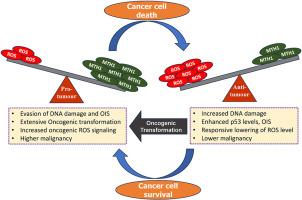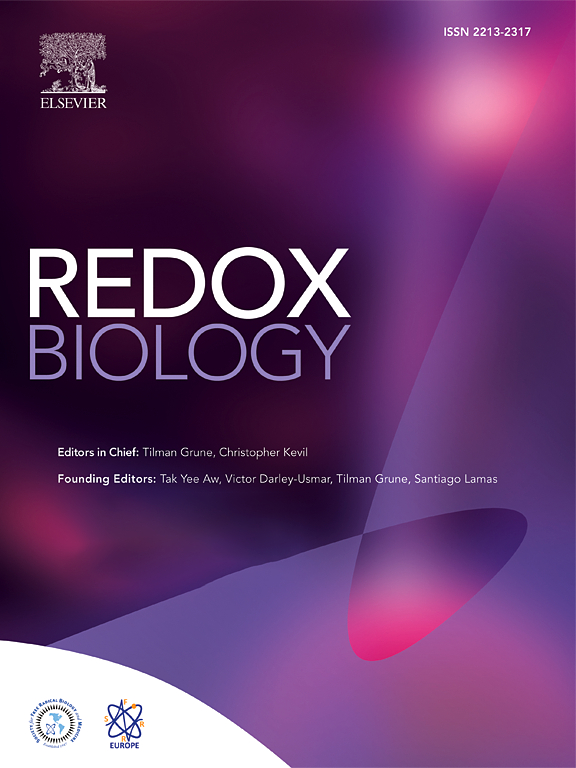Role of MTH1 in oxidative stress and therapeutic targeting of cancer
IF 10.7
1区 生物学
Q1 BIOCHEMISTRY & MOLECULAR BIOLOGY
引用次数: 0
Abstract
Cancer cells maintain high levels of reactive oxygen species (ROS) to drive their growth, but ROS can trigger cell death through oxidative stress and DNA damage. To survive enhanced ROS levels, cancer cells activate their antioxidant defenses. One such defense is MTH1, an enzyme that prevents the incorporation of oxidized nucleotides into DNA, thus preventing DNA damage and allowing cancer to proliferate. MTH1 levels are often elevated in many cancers, and thus, inhibiting MTH1 is an attractive strategy for suppressing tumor growth and metastasis. Targeted MTH1 inhibition can induce DNA damage in cancer cells, exploiting their vulnerability to oxidative stress and selectively targeting them for destruction. Targeting MTH1 is promising for cancer treatment because normal cells have lower ROS levels and are less dependent on these pathways, making the approach both effective and specific to cancer. This review aims to investigate the potential of MTH1 as a therapeutic target, especially in cancer treatment, offering detailed insights into its structure, function, and role in disease progression. We also discussed various MTH1 inhibitors that have been developed to selectively induce oxidative damage in cancer cells, though their effectiveness varies. In addition, this review provide deeper mechanistic insights into the role of MTH1 in cancer prevention and oxidative stress management in various diseases.

MTH1 在氧化应激和癌症靶向治疗中的作用
癌细胞维持高水平的活性氧(ROS)以驱动其生长,但 ROS 可通过氧化应激和 DNA 损伤引发细胞死亡。为了生存,癌细胞会激活其抗氧化防御系统。MTH1 就是这样一种防御机制,它是一种防止氧化核苷酸掺入 DNA 的酶,从而防止 DNA 损伤,使癌细胞得以增殖。在许多癌症中,MTH1 的水平经常升高,因此,抑制 MTH1 是抑制肿瘤生长和转移的一种有吸引力的策略。靶向抑制 MTH1 可诱导癌细胞 DNA 损伤,利用癌细胞对氧化应激的脆弱性,有选择性地对其进行靶向破坏。靶向 MTH1 在癌症治疗中大有可为,因为正常细胞的 ROS 水平较低,对这些途径的依赖性较低,因此这种方法对癌症既有效又有特异性。本综述旨在研究 MTH1 作为治疗靶点的潜力,尤其是在癌症治疗中的作用,详细介绍其结构、功能和在疾病进展中的作用。我们还讨论了已开发出的各种 MTH1 抑制剂,这些抑制剂可选择性地诱导癌细胞发生氧化损伤,但效果各异。此外,本综述还从机理角度深入探讨了 MTH1 在癌症预防和各种疾病的氧化应激管理中的作用。
本文章由计算机程序翻译,如有差异,请以英文原文为准。
求助全文
约1分钟内获得全文
求助全文
来源期刊

Redox Biology
BIOCHEMISTRY & MOLECULAR BIOLOGY-
CiteScore
19.90
自引率
3.50%
发文量
318
审稿时长
25 days
期刊介绍:
Redox Biology is the official journal of the Society for Redox Biology and Medicine and the Society for Free Radical Research-Europe. It is also affiliated with the International Society for Free Radical Research (SFRRI). This journal serves as a platform for publishing pioneering research, innovative methods, and comprehensive review articles in the field of redox biology, encompassing both health and disease.
Redox Biology welcomes various forms of contributions, including research articles (short or full communications), methods, mini-reviews, and commentaries. Through its diverse range of published content, Redox Biology aims to foster advancements and insights in the understanding of redox biology and its implications.
 求助内容:
求助内容: 应助结果提醒方式:
应助结果提醒方式:


